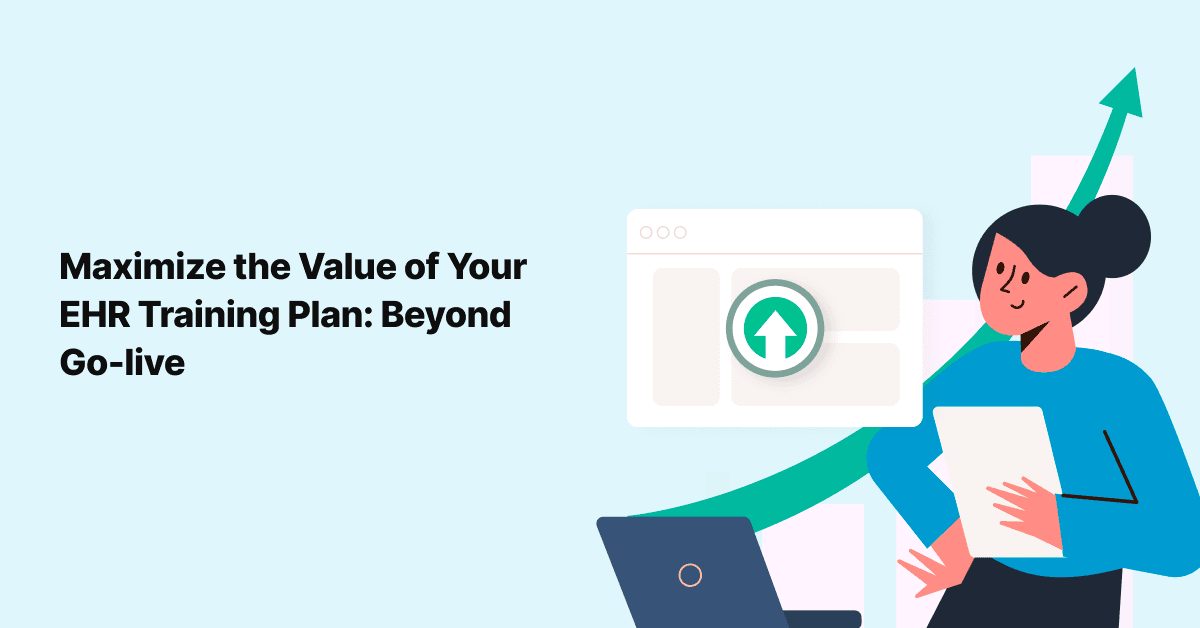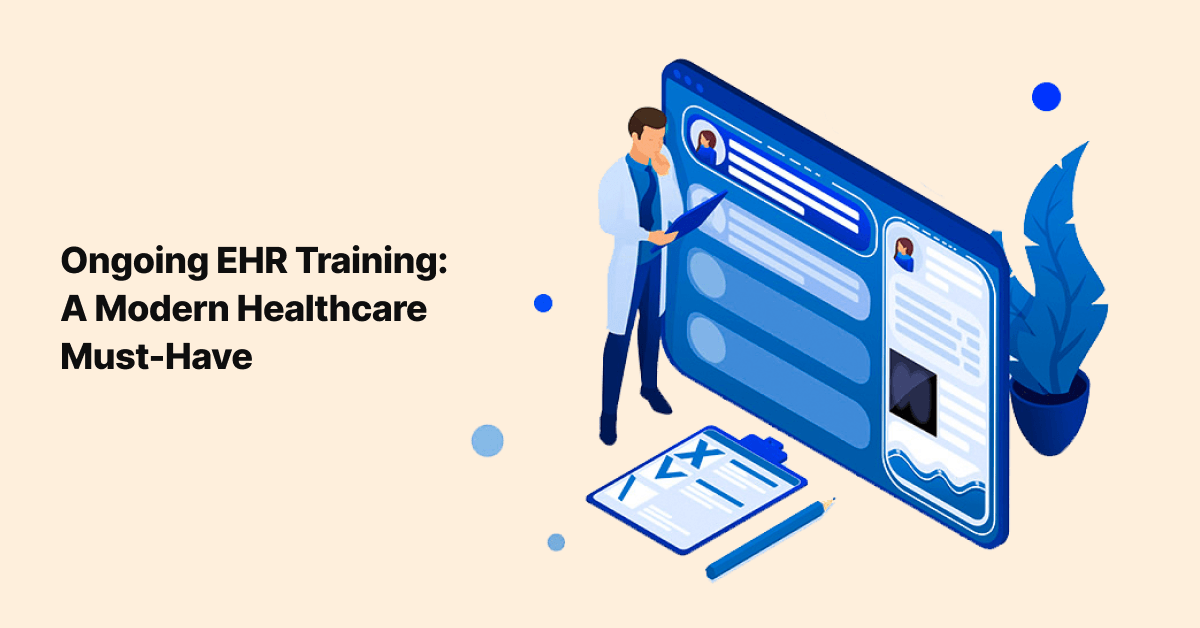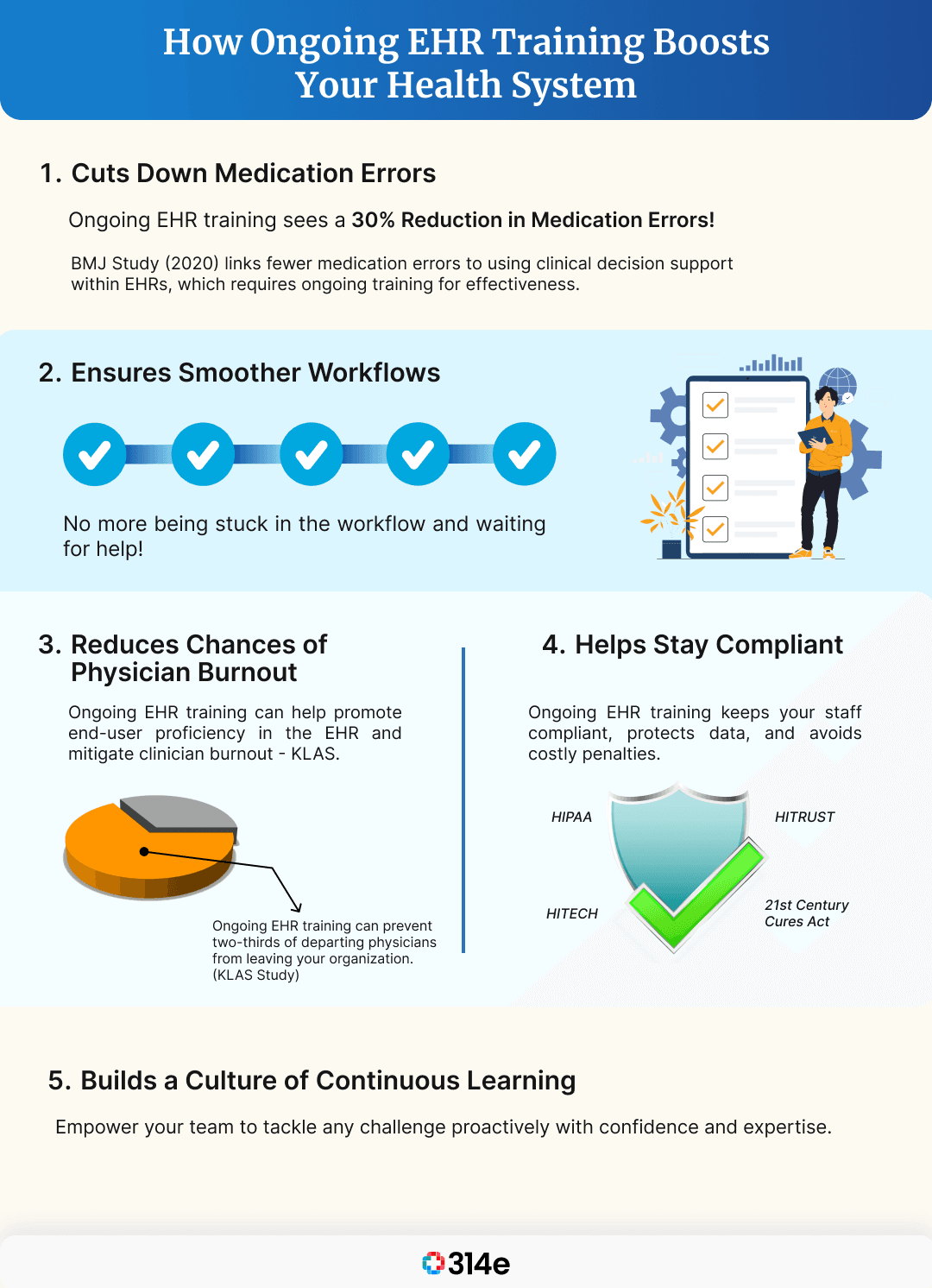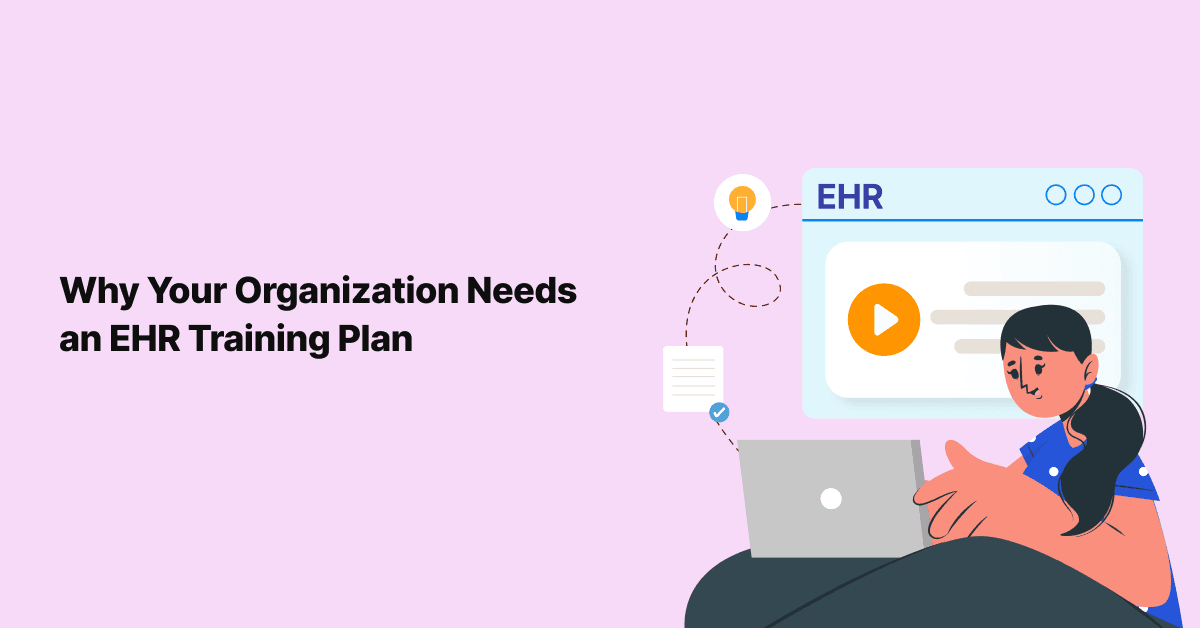
Maximizing the Value of Your EHR Training Plan: Beyond Go-live
Electronic Health Records (EHRs) have ushered in a new era of healthcare, transforming patient care, data …

EHR Implementation ✅, Well-planned Onboarding Training ✅
But what about ongoing EHR training? 🤔
If that question gave you pause, you're not alone. Everyone in healthcare likely has an EHR system in place by now – whether they're sticking with it, switching to a new one, or upgrading their current system. While the initial training for these systems is crucial, the commitment to continuous learning often falls by the wayside.
It's a common refrain: "The EHR is a complex application." And indeed, such complexity demands ongoing attention. While initial training is crucial and retains its value for a time, what comes after?
Enter ongoing EHR training.
In this blog post, we delve into why ongoing EHR training is the missing link in modern healthcare and how it can address the challenges post-implementation.
What this blog post covers:
Onboarding training is crucial – it equips your team with the basics to navigate the new EHR system. However, thinking it's enough is like building a house on a foundation of sand. Here's why:
Have you ever learned a new skill, like riding a bike? Remember that initial feeling of wobbling all over the place? But with practice, you eventually mastered it, gliding effortlessly on two wheels. Now, imagine leaving that bike untouched in the garage for months. When you hop back on, you might feel a little rusty, needing some time to regain your balance and confidence.
This phenomenon of forgetting information over time is a well-documented concept in psychology known as the Ebbinghaus Forgetting Curve. Named after German psychologist Hermann Ebbinghaus, this curve illustrates how our memory retention declines rapidly after initial learning.
The same principle applies to EHR training. Even the most attentive trainees who aced their onboarding training will gradually forget details without consistent practice and reinforcement. This is where ongoing EHR training comes in.
Think of ongoing training as a mental workout for your staff's EHR skills. Just like regular exercise keeps your body in shape, regular training sessions keep those crucial EHR skills sharp and readily available. This ensures your team can access information quickly and confidently, leading to better patient care and improved efficiency.
The healthcare landscape is constantly evolving. New regulations emerge, best practices get refined, and innovative technologies are introduced all the time. While onboarding training equips your staff with the foundational knowledge to navigate the EHR system, it's just a snapshot in time.
Imagine a city map. It helps you navigate the initial layout of streets and landmarks. But what happens when new roads are built or significant landmarks undergo renovations? You wouldn't rely on that outdated map forever, would you?
Ongoing EHR training is like having the latest edition of your city map. It ensures your staff has the most up-to-date information and functionalities at their fingertips. This allows them to adapt to new workflows seamlessly, optimize their use of the system, and continuously improve patient care delivery.
By investing in ongoing EHR training, you're not just refreshing your team's memory; you're equipping them with the tools they need to stay ahead of the curve and thrive in the ever-changing world of healthcare.
Building on Alistair Erskine's point in his webinar "Strategies for Keeping Users Trained Up on Ever-Changing Applications," learning is a continuous journey, and so is training.
Erskine emphasizes this by stating:
“So I think that the training piece, and I'm sure others would agree, isn't a discrete component that's delivered over a small period of time, but instead something that occurs over a longer time frame. In fact, the training is forever. The system is changing forever. Medicine is changing. The workflows, new technologies changing forever. Therefore, it's continuous training.”
In essence, embracing the concept of continuous learning and training is imperative for staying ahead in the ever-evolving landscape of healthcare IT.
Want to learn more about the specific challenges that arise after go-live and how ongoing training can help? Read our blog post, Maximizing the Value of Your EHR Training Plan: Beyond Go-Live.
The pressure to deliver effective and sustainable ongoing training can feel overwhelming. But here's the good news: the responsibility doesn't have to fall solely on your shoulders.
So, how do we cultivate a culture of shared responsibility for successful ongoing EHR training?
Here's a breakdown of how different departments can contribute:
Partner with department heads to ensure your training content reflects the specific workflows and challenges their teams face. These Subject Matter Experts (SMEs) can validate the relevance and applicability of your training materials, ensuring they translate to real-world use cases.
IT and training teams possess an in-depth understanding of the EHR system's functionalities. Collaborate with them to develop clear, engaging training materials that translate complex features into actionable skills for end-users.
Executive leaders such as CIOs and CMIOs set the strategic direction. Advocate for their support by highlighting the value of continuous learning. Encourage them to allocate sufficient resources (budget and staff time) for ongoing EHR training programs. Additionally, clear expectations for training completion communicated from leadership demonstrate the importance of staying up-to-date.
Don't underestimate the power of user feedback! EHR users are the most valuable asset in your training ecosystem. Develop mechanisms to gather their insights on training programs and their experiences with the EHR system itself. This continuous feedback loop allows you to identify knowledge gaps, refine your programs, and ensure they remain relevant and effective.

Mastering an EHR is like mastering a language – it takes practice and adaptation. But unlike most languages, EHRs keep evolving. Here's how ongoing EHR training keeps your team speaking EHR fluently, leading to a healthier bottom line and a healthier workforce:
Faster Diagnoses: Trained staff finds crucial information quicker, leading to speedier and more accurate diagnoses.
Fewer Errors: Regular training minimizes data entry mistakes, ensuring patient records are accurate and reliable.
Seamless Communication: EHR proficiency fosters smooth communication between healthcare providers, keeping everyone on the same page.
Effortless Workflows: Training on new features translates to smoother workflows and less troubleshooting time.
Time Well Spent: Clear training on best practices frees up valuable time for patient interaction.
Reduced Support Tickets: Proactive training means less reliance on IT support, allowing them to focus elsewhere.
Less Frustration: Regular training combats confusion caused by outdated knowledge or new features, a major contributor to physician burnout.
Increased Confidence: Strong EHR knowledge empowers physicians to navigate the system efficiently, reducing stress.
Focus on Patients: By minimizing time spent wrestling with the EHR, physicians can focus on what matters most – patient care. This fosters a sense of accomplishment and combats burnout.
Regulation Readiness: Up-to-date training ensures staff is aware of the latest regulations and uses the EHR compliantly. This minimizes errors and potential penalties.
Constant Evolution: Ongoing EHR training creates a culture where learning is valued, fostering a more adaptable workforce ready for new technologies and best practices.
Investing in ongoing EHR training isn't optional – it's a strategic investment. You'll see the results in improved patient care, happier staff with lower burnout rates, and a more efficient healthcare system.
In search of a solution to streamline your ongoing EHR training efforts? Look no further than Jeeves! With Jeeves, the AI-powered Just-in-Time training platform, continuous learning becomes effortless through its curated collection of bite-sized videos and tip sheets. Experience the ease of staying updated and proficient in EHR usage with Jeeves by your side.
Join over 3,200 subscribers and keep up-to-date with the latest innovations & best practices in Healthcare IT.

Electronic Health Records (EHRs) have ushered in a new era of healthcare, transforming patient care, data …

Every health system boasts an EHR training plan, but the critical question lingers: is it right on target? …

In today’s digital age, the healthcare industry has undergone a significant transformation with the widespread …